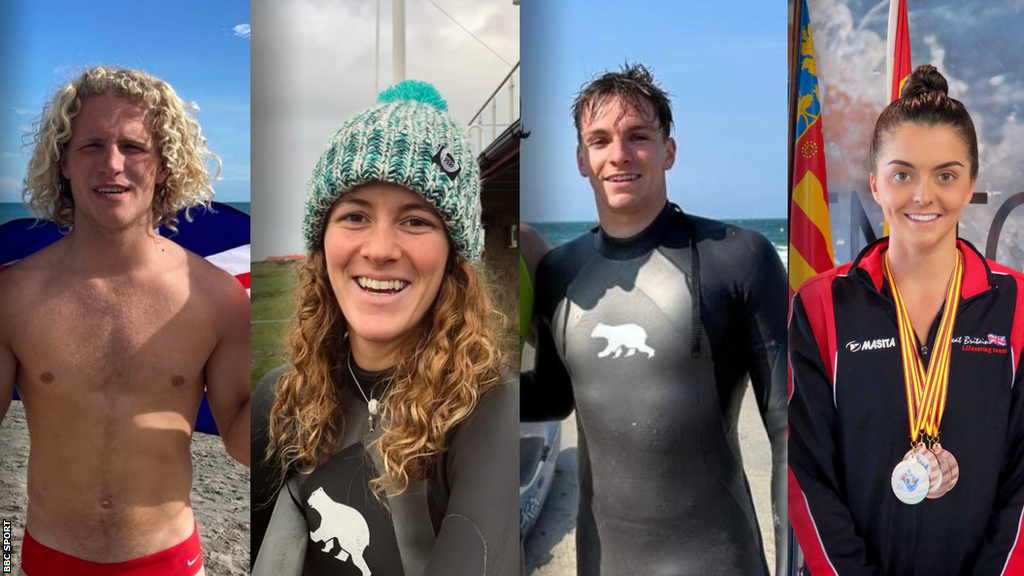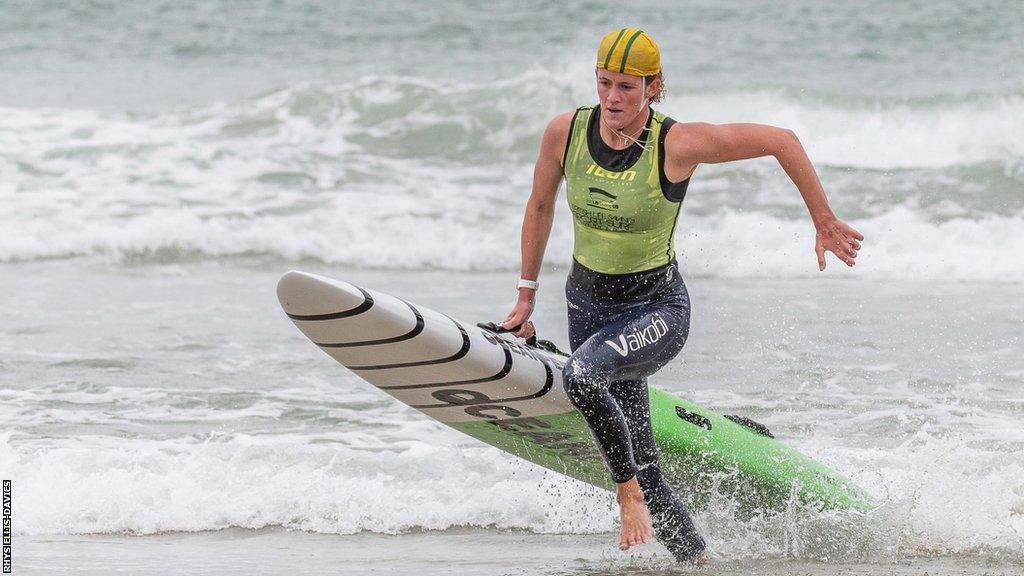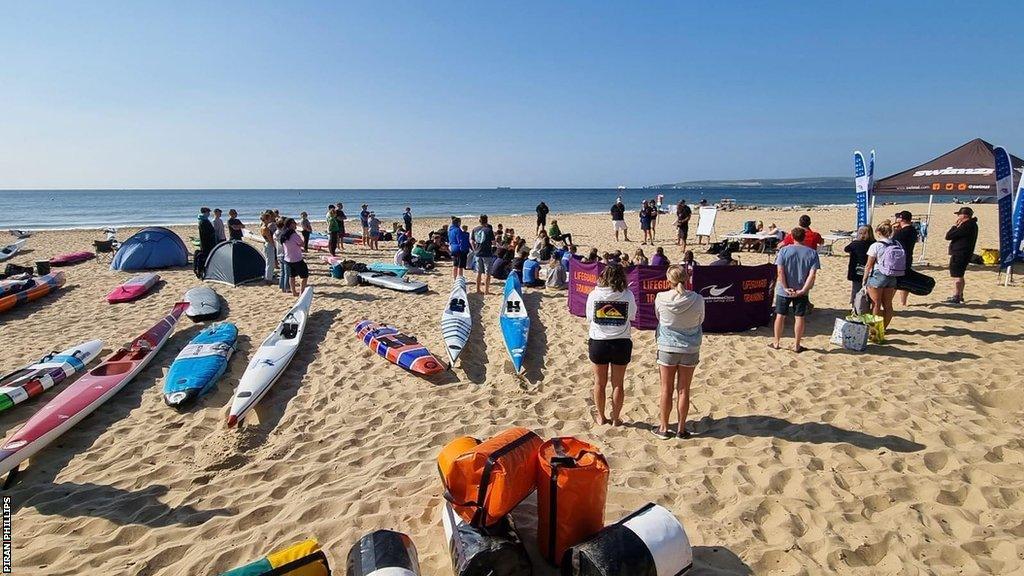European Lifesaving Championships: The British lifeguards on a mission to rescue gold in Belgium
- Published

Piran Phillips (left), Ellie McCloy (second left), Bob Whittaker (second right) and Emma Henderson (right) are part of a 12 strong team selected to represent GBR at the European Lifesaving Championships 2023
Members of Britain's squad for the European Lifesaving Championships say they have their eyes on making a splash with a haul of medals in Belgium.
A team of 12 has been selected to compete against the continent's best lifeguards in a series of indoor and outdoor events in Bruges in September.
"Making the GBR team for lifesaving is part one of the dream," British athlete Piran Phillips told BBC Sport.
"Part two of that dream is bringing home a gold medal."
The European Lifesaving Championships, external - organised by the International Life Saving Federation of Europe (ILSE) - is a competition that is held every two years.
More than 400 lifeguards will travel to this year's event and battle it out in a variety of races that take place in the pool, on the beach and in the sea.
The disciplines include swimming to rescue manikins, a simulated emergency response to help an injured person and surf and ski races on boards and kayaks.
Competitors are awarded points after each race, with the fastest earning the most to go toward their nation's overall tally. The team with the most points at the end of the competition wins gold.
The 10 days of racing is turbo charged with lifeguards motoring through the water, knifing through the sand on the beaches and thudding into waves before crashing into the sea.
European Championship is 'the biggest race of my season'
Piran Phillips (right) takes to the water in a competitive lifesaving race
Phillips, from Cornwall, and fellow GBR selection Bob Whittaker, from Devon, are both students in Southampton and train together throughout the year between their studies.
"It's great to have Piran to paddle with and there's never a dull moment training with him," Whittaker said.
"Competitive lifesaving gives me the opportunity to push myself every day in training and have fun negotiating different conditions in the sea.
"I think my main competition at the Euros in Bruges will be the French national team, they have a great ocean squad and are always well prepared."
Phillips says training with Whittaker makes him stronger. "Training together in Southampton has been awesome," he added.
"Bob is more experienced than me and he is the man to beat in the sport in the northern hemisphere.
"His commitment to lifesaving has rubbed off on me and I want to be the best, but to do that I have to out work him, and that's almost impossible."
The European Lifesaving Championships is one of the most important events in the competitive lifesaving calendar alongside the World Lifesaving Championships.
The Great Britain squad had to come through national trials - that were held in Branksome, Dorset in April - to secure their spot on the team.
Ellie McCloy, from Porthcawl in South Wales, started lifesaving at the age of seven and was selected to represent the GBR women's team.
"The European Champs is a big event and we haven't taken a team since 2019 because of COVID," said the 22-year-old medicine student.
"It's the biggest race of my season and I've been following a periodised training plan to peak for the event."
'In Australia lifesaving is a professional sport - with big prize money'

Ellie McCloy, from South Wales, is one of six women selected to represent GBR at the European Championships.
McCloy - who was the first European and non-professional athlete to cross the line in the Ironwoman Open category at last year's World Championships - says GBR has an incredibly strong team for the beach events and is aiming to finish in the top three overall.
She explains how lifesaving has evolved into a sport. "It began to protect people from the dangers of the beach," she said.
"To make lifeguards stronger, faster and fitter, friendly competition has evolved into what is now a highly competitive sport.
"The sport requires a high level of fitness and skill over many disciplines.
"In Australia, lifesaving is a professional sport with paid athletes and big prize money.
"Lifesaving is building popularity in the UK, we have National Championships each year, and there is a European and World Championships alternating years."
'It is gruelling'

Great Britain's lifesaving team had to come through national trials in Dorset to secure their spot in the squad for the European Championships
McCloy's team-mate Emma Henderson, from Belfast, is one of GBR's most experienced athletes and a pool specialist.
"I'm most looking forward to the 200m Super Lifesaver event because it combines every aspect of the pool discipline," said the 25-year-old physiotherapist.
"The first 75m is a straight swim then you grab a mannequin off the pool floor and carry it 25m through the water.
"You then drop the mannequin, put on fins (flippers) and a torpedo buoy (float), swim another 50m and then clip a mannequin onto your buoy and swim the final 50m with it attached.
"It is gruelling and you have to dig deep to finish that final leg of the race."
Before she got into lifesaving Henderson was a competitive swimmer and more used to swimming up-and-down an indoor pool in traditional races.
But she was inspired to give high performance lifesaving a try after being inspired by her two older sisters who both represented GBR in the sport.
"I was selected to my first ever GBR team 10 years ago," she added.
"I saw my sisters competing and thought I would give it a try as well.
"As one of the more experienced athletes on GBR going to the Euros I am hoping I can use my knowledge to help some of the newer faces on the squad."
The European Lifesaving Championships take place in Bruges, Belgium from 14 - 21 September.